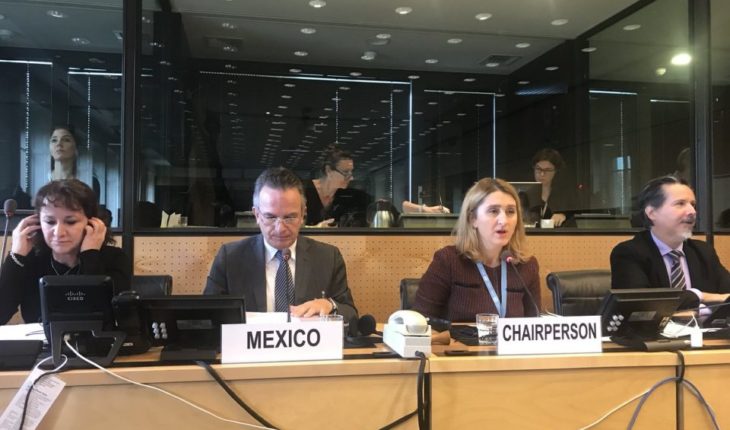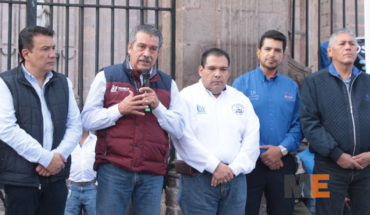specialists that make up the UN Committee specializing in cases of forced disappearance exhibited this Friday in Geneva, Switzerland, failures, and contradictions of the Government and the State Mexican in the task of search, at least 37 thousand people not located or missing.
One by one, in the Palais Wilson in Geneva, Switzerland, as part of a follow-up meeting, since Mexico ratified the International Convention for the protection of persons from enforced disappearance, experts raised questions to the delegation Mexican, headed by Undersecretary Miguel Ruiz Cabañas.
Among other points, Mexico were asked why if its officials say they are open to international scrutiny, the Government of Enrique Peña Nieto has not accepted the Committee entering the country and its competition for individual cases of disappearance forced, that they have not found justice with the national authorities.
Ruiz Cabañas, accordingly, insisted that before accepting the competence of the Committee, the Mexican State opted to give “priority” to the institutional legal system, with the entry into force this year, in January, of the General Law on enforced disappearances of People, disappearance committed by private individuals and the national system of search of persons.
Accordingly Grace Fernández, of the movement for our missing, said in interview that it is “frustrating” that the delegation of Mexican officials used that argument, because in fact Mexico has not strengthened its institutions to serve this evil, at least not enough given the extent of the problem of violence and disappearances.
“Where is the building?”, criticized Fernandez in a pause of the dialogue between experts from the UN and the Mexican delegation.
“We do not come here to deny the dimensions of the phenomenon, nor the pain caused to victims,” said at a time when Ambassador Ruiz Cabañas, although it also highlighted as advance the enactment of the General Act, and its impact.
“While it is too early to make a definitive assessment, already have the tools that now they must be properly implemented”, said Cabañas.
The Group of experts of the U.N. Committee was chaired by the sole Janina, Albania expert.
Another point that questioned the experts is when will Mexico in each of their States a local Committee on search for the disappeared, and prosecutors specialized in all the institutions, as the General Law, marks it if you have time to do so.
The Mexican delegation did not indicate if there is a deadline, and the National Commissioner of search, Roberto Cabrera, said that only nine States of the country have set up local commissions, even under progress.
In as to whether the National Search Commission has budget sufficient, as they asked experts, Cabrera said that in 2018 it had a budget of about 478 billion pesos, and that to 2019 had planned request for that instance an increase to 609 million .
Read: Mexico seeks to 37 thousand disappeared with an incomplete system and without sufficient resources Cabrera spoke about how was the transition from the national registry of data of persons lost or missing (RNPED), to the new record that the General Law on matter of forced disappearance, published in 2017.
Experts had questioned him if had not lost data, to make the transition. Cabrera said that they have been implemented measures to improve these missing persons records, although he agreed that so far, which inherited the RNPED, “is very poor” information that is.
The above, is “one of the greatest constraints we have”, accepted Cabrera to the experts.
The own Cabrera, to answer other questions of experts, said that with the RNPED had the record of 384 foreign or migrant persons are missing in Mexico.
Abel Gallardo, attorney specializing in the investigation of crimes of enforced disappearance, PGR gave the information that the Prosecutor who heads have open a few thousand records, 114 of them for the crime of enforced disappearance.
In other shifts, the experts noted with reports on cases in Mexico where the investigations into disappearances do not start immediately, or that is bound to be a bureaucratic formality, without having effective searches on the ground, to be practical.
Also questioned is guaranteed the independence of prosecutors to investigate cases of disappearances, and in particular at what point is the process to appoint the Attorney general.
Ruiz Cabañas, in his first speech at the session, said that the disappearance of persons is the “gravest challenge” facing the Mexican State, in the field of human rights.
“We understand the frustration that the disappearance of a loved one is for fathers, mothers, brothers and sisters.” We recognize that the responses of the State are still insufficient and that the challenges are enormous,”said the Undersecretary.
This meeting in Switzerland, until 15:00 hours (Geneva time) was still in development, was scheduled as a follow-up to recommendations made by the Committee to Mexico, by 2015. A couple of days after the Universal periodic review (UPR), another mechanism of the United Nations in Geneva, in which more than 100 Nations made observations and recommendations on the human rights crisis affecting Mexico.
Bureaucratic mazes and afraid to report at the second part of the meeting, the experts pointed out that the victims in Mexico face bureaucratic “labyrinths” for help, and even one of them raised a group of independent, external, check the work of the Executive Committee of care of victims (CEAV), to propose improvements.
Jaime Rochín, holder of the CEAV, said that it is working to make the Commission more agile; in the next few days, he explained, a regulation will be published and it will include a point so that people, just with protest to tell the truth, to access the supports, among other measures.
In the national registry of victims of federal immunity, he explained Rochin, 406 direct victims of enforced disappearance, are recorded cases where corporations such as the army, Navy and Federal police intervened. 60% of the victims are men and 40% women.
Citizens in Mexico, said at the time the expert Daniel Figallo, according to reports has won over the country, facing fear denouncing cases of disappearance, by distrust of the authorities, and that and other factors lead to that it prevails the impunity.
“Here there is a State policy, it is not the State which has a policy of disappearances of people,” said Ambassador Ruiz Cabañas, once one of the experts compared the situation in Mexico with the dictatorship in South American countries, in the 70’s.
The Under-Secretary for multilateral affairs and human rights said that the country has a problem of disappearances, that you can not refuse, and that there have been abuses and involvement of agents of the State in some of these disappearances.
However, he said, there are a huge number of disappearances that are committed by bands of organized crime, that are in conflict.
translated from Spanish: UN exhibit failures of the Mexican State in search of missing
November 9, 2018 |





